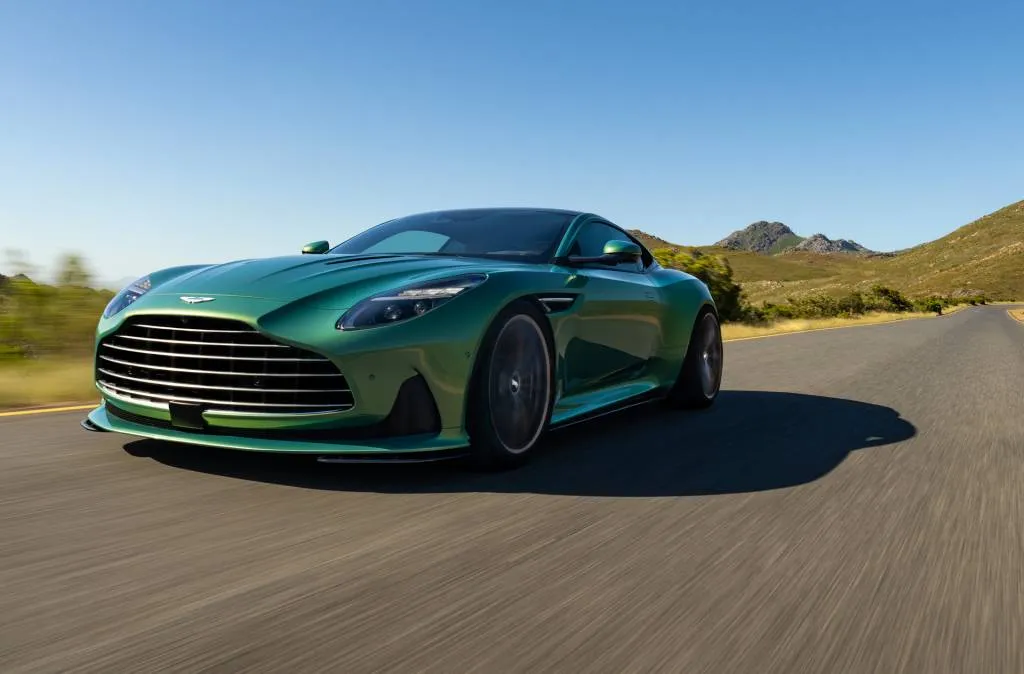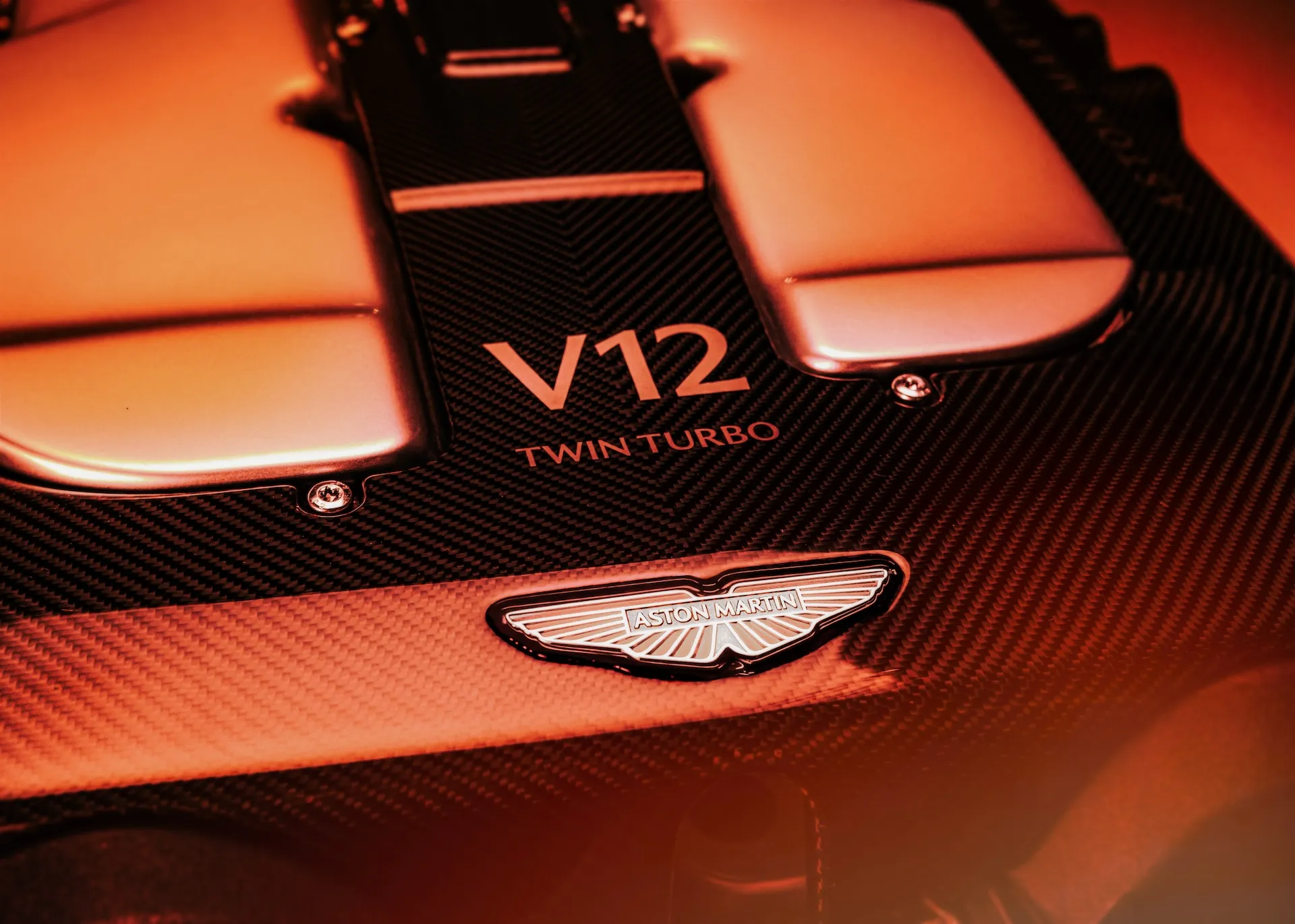Aston Martin’s DBS successor will feature a new V-12 engine because it’s what its customers want, Alex Long, the automaker’s head of product and marketing strategy, said in a recent interview with CarThrottle.
The engine was recently confirmed by Aston Martin to be a newly developed version of the existing twin-turbocharged 5.2-liter V-12, and carry an 824-hp output in the DBS successor, a car tipped to revive the Vanquish nameplate.
Big engines aren’t really necessary anymore for performance. Aston Martin currently races in Formula 1 with turbocharged V-6 hybrid powertrains, and both the Ferrari 296 GTB and McLaren Artura supercars use twin-turbocharged V-6 engines as part of their respective plug-in hybrid powertrains. But customers in this high-end segment also want emotion, and that requires more cylinders, Long argued.
“It’s not just about going as fast as I can,” Long said. “I do want some emotion on the way, I want some real sound and rumble, and I want to know and think and say it’s a V-8 or a V-12 because V-8s [and] V-12s have generally been reserved for very special and interesting products whereas V-6s very much aren’t in the premium segment.”

Aston Martin DB12
Long also noted that, since the pandemic, there has been “a real resurgence for V-8,” in part because of the use case of Aston’s wealthy customers. An Aston Martin typically isn’t the only car in a household, Long said, explaining that customers may even have an EV for more regular use, keeping the V-8 car around for its “sound, noise, vibration, and so on.”
Stricter emissions standards are causing even high-end brands to take a closer look at electrification and smaller engines, but Long isn’t the only executive that’s hesitant about this trend. Lamborghini will launch its first EV in 2028, but it won’t be one of the brand’s traditional supercars because, CEO Stephan Winkelmann has said, demand for electric supercars remains nascent.
Even Mate Rimac, founder and CEO of electric hypercar builder Rimac, sees a future for big engines. As head of the parent company of both Rimac and Bugatti, he’s currently overseeing the launch of a Bugatti Chiron successor with a V-16 hybrid powertrain. And he’s said Rimac’s future lies in groundbreaking tech—not EVs alone.

продвижение в google продвижение в google .
снятие ломки у наркомана снятие ломки у наркомана .
вывод из запоя на дому ростов на дону вывод из запоя на дому ростов на дону .
после капельницы от запоя на дому после капельницы от запоя на дому .
неотложная наркологическая помощь в москве skoraya-narkologicheskaya-pomoshch12.ru .
скорая наркологическая помощь на дому в москве http://skoraya-narkologicheskaya-pomoshch16.ru/ .
малый бизнес-идеи малый бизнес-идеи .
поролон мебельный 100мм поролон мебельный 100мм .
малый бизнес идеи малый бизнес идеи .
шторы на раму rulonnye-shtory-s-elektroprivodom.ru .
магазин электрокарнизов http://elektrokarniz2.ru .
бизнес идеи для малого бизнеса бизнес идеи для малого бизнеса .
пробить местоположение по номеру poisk-po-nomery.ru .
купить станок лазерной резки металла купить станок лазерной резки металла .
Нарколог на дом в Казахстане Нарколог на дом в Казахстане .
курс юань тенге курс юань тенге .
watch stories anonymously watch stories anonymously .
порно с мамой порно с мамой .
instagram stories anonymously instagram stories anonymously .
telefon powerbank telefon powerbank .
росгвардия сигнализация для дома росгвардия сигнализация для дома .
лучшие капперы мира лучшие капперы мира .
эскорт москва эскорт москва .
снять проститутку снять проститутку .
instagram viewer [url=https://anstoriesview.com/]https://anstoriesview.com/[/url] .
instagram viewer [url=https://anonstoriesview.com/]instagram viewer[/url] .
1win apk download 1win apk download .
best instagram viewer best instagram viewer .
t?l?charger 1win apk http://xn--tlcharger1win-bhbb.com/ .
электроуправляемые карнизы электроуправляемые карнизы .
купить диплом врача стоматолога realdiplom.ru .
нарколог вывод из запоя москва нарколог вывод из запоя москва .
вывод из запоя на дому в москвае http://vyvod-iz-zapoya-moskva13.ru .
капельница от запоя в балашихе капельница от запоя в балашихе .
капельница при алкогольной интоксикации на дому цена капельница при алкогольной интоксикации на дому цена .
Быстрая покупка диплома старого образца: возможные риски
Полезные советы по безопасной покупке диплома о высшем образовании
Можно ли купить аттестат о среднем образовании, основные моменты и вопросы
Как не попасть впросак при покупке диплома колледжа или ПТУ в России
Как официально купить диплом вуза с упрощенным обучением в Москве
купить диплом академии купить диплом академии .
Купить диплом о высшем образовании в Воронеже
обложку на диплом о высшем образовании купить москва